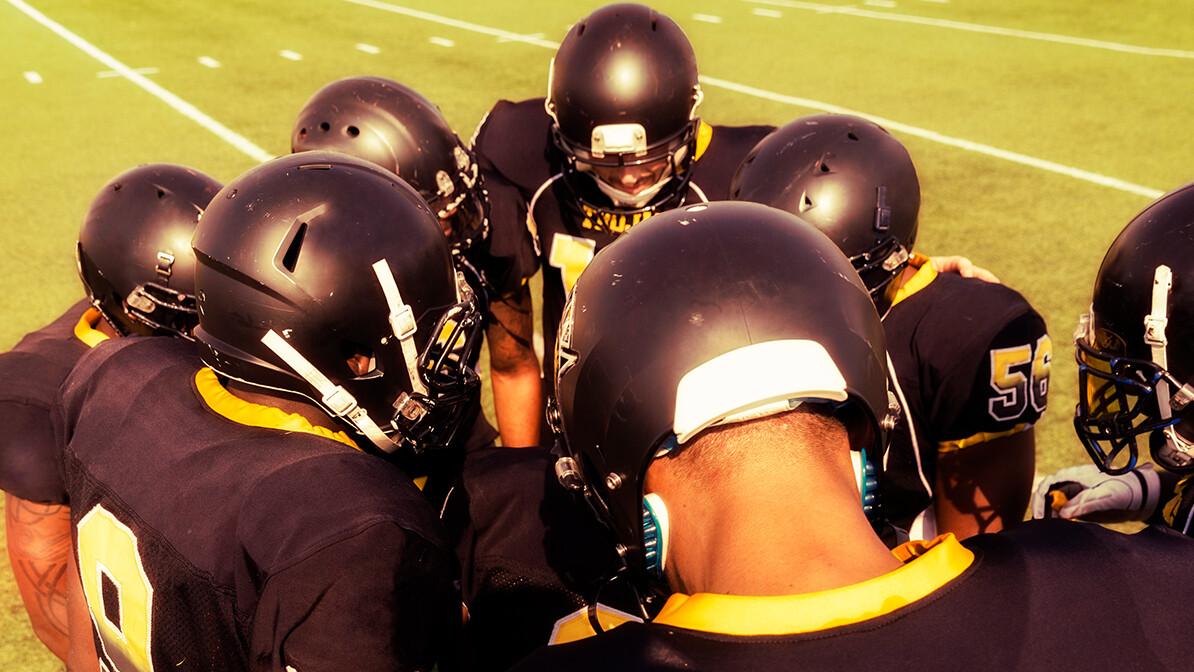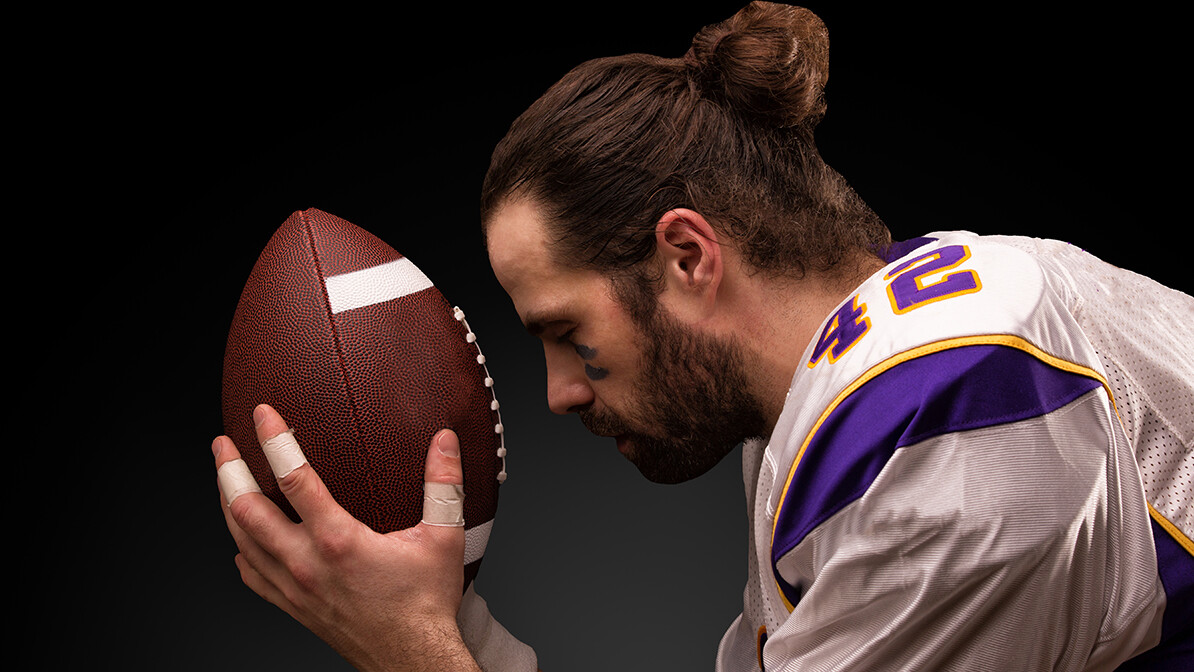- Home
- Entertainment
- The Biggest Win (Part 2)

The Biggest Win (Part 2)
 Book Excerpt from The Biggest Win: Pro Football Players Tackle Faith by Joshua Cooley
Book Excerpt from The Biggest Win: Pro Football Players Tackle Faith by Joshua Cooley
The “How” of Spiritual Training
Now let’s discuss the “how.” The Bible is quite specific in this regard. There’s no confusing playbook jargon or jumbled mishmash of X’s and O’s here. First, we must acknowledge that any spiritual training starts with God’s grace. God gives us Spirit-filled hearts that desire to follow him (Ezekiel 36:26-27); and his Spirit powerfully guides, empowers, and equips believers to seek after the things of the Lord.
Here’s a ten-step training regimen every believer should follow when pursuing God’s glory:
1. Study and meditate on Scripture often. The Bible is our ultimate training manual. “All Scripture is breathed out by God and profitable for teaching, for reproof, for correction, and for training in righteousness, that the man of God may be complete, equipped for every good work” (2 Timothy 3:16-17, emphasis added). It’s the only offensive weapon listed in the “armor of God” passage of Ephesians 6:10-18 for our fight against Satan. And Hebrews 4:12 speaks to Scripture’s matchless potency: “For the word of God is living and active, sharper than any two-edged sword, piercing to the division of soul and of spirit, of joints and of marrow, and discerning the thoughts and intentions of the heart.” Athletes who want to train in God-glorifying ways will “delight” in God’s Word “as much as in all riches” (Psalm 1119:14).
But this training isn’t just “going through the motions” with Scripture—there is meditation. Christian meditation has nothing to do with Eastern transcendentalism. To meditate as a Christ-follower means to study God’s Word diligently and prayerfully reflect on it, in quiet moments with the Lord and throughout the day. To meditate is to keep the “living and active” Word living and active in your daily thoughts.
“Being an athlete really clarifies lot of things for me,” Chris Maragos says. “If I want to outpour as an athlete, I have to intake the right things. If I want to grow in the Lord, I have intake the right things, as well. So it’s extremely important to read the Bible and grow in the grace of the Lord, to read about what Jesus did on the cross.”
2. Pray continually. Just as praying daily is a critical way to keep your identity rooted in Christ, it’s also a vital part of the Christian athlete’s daily training plan. Jesus prayer often (Matthew 26:36-44; Mark 1:35; Luke 3:21; 9:18), and encouraged his followers “always to pray and not lose heart” (Luke 18:1). Prayer helps us direct praise to its proper destination (Matthew 6:9), confess our sins (Psalm 51:1-12), draw spiritual strength from the proper source (Psalm 3:1-4), and kill our pride. The athlete who doesn’t pray well doesn’t train well.
3. Be intentional with daily devotional times. … Nick Foles calls spending time in God’s Word “getting fuel for the day.” He usually blends spiritual with the other type of boost he craves. “I love coffee,” he says. On most days, Foles gets up around 6:30, grabs his Bible (or smartphone with a Bible app), hops on a two-by-two-foot vibration plate and turns it on. Instantly, thirty vibrations per second—supplemented by a power-packed liquid concoction of coffee beans, butter, protein, and oil—begin jolting his drowsy body to life as he prays and reads Scripture. “I’m getting my body ready to play,” he says, “along with my spirit and mind.”
There are times when work begins even earlier. On those days, Foles doesn’t sacrifice his devotional time—he sets the alarm clock to times that would make even the pluckiest rooster yawn. “For me, it’s non-negotiable,” he says. “If I’ve got to get in at 6, I get up at 4. If I’ve got to get in at 4, I get up at 2. I know what it’s like not getting in the Word. My day seems to spin out of control.” Foles has something in common with the writer of Psalm 119: “I rise before dawn and cry for help; I hope in your words. My eyes are awake before the watches of the night, that I may meditate on your promise” (vv. 147-148).
“My wife thinks I’m crazy at times, but I’ve got to get up before the day gets going,” he says. “It doesn’t have meaning if I don’t get it going before then. Selfish desires creep in if I haven’t humbled myself daily.”
Setting up a routine encourages a faithful, passionate pursuit of God. In ancient Israel, King David instructed the Levites to stand at the tabernacle “every morning, thanking and praising the Lord, and likewise at evening” (1 Chronicles 23:30). Daniel “got down on his knees three times a day and prayed and gave thanks before his God” (Daniel 6:10). And the earliest Christians in Acts 2:46 devoted themselves to “day by day, attending the temple together and breaking bread in their homes.”
Athletes can relate to routines. “In the sense of being an athlete, everything is routine,” Zach Ertz says. “At practice, you start with your warm-up, then you get into a little lighter part of practice. Then the last two hours is all the intense stuff. It’s the same thing in the offseason. You train X amount of hours, then you have the rest of the day. It’s scheduled when you’re supposed to eat, when you’re supposed to sleep. Everything is regimented.”
When Ertz reads 1 Timothy 4:7, he sees God calling him to a similar immersion into spiritual training. “If I’m not reading the Word or infusing the Spirit or reading the Word and living by it, then eventually I’m going to start slipping up,” he says. “I’ll be living differently. My mindset is going to be different because it’s going to be me-focused instead of Christ-focused.”
4. …. but also be flexible with your time. God-glorifying athletes will be intentional in their daily devotion, but won’t let the routine rule them. They will create moments to worship God that are anything but routine.
Carson Wentz knows this all too well. During the long football season, time is a luxury. He has to be deliberate and resourceful to train himself daily. He fills his thirty-minute commute with Christian podcasts or worship music. If he has a break between meetings, he’ll often find a quit spot and open God’s Word rather than hop on social media. Once the long day is done, he read Scripture in the quiet moments before slumber. “I’m not the only one with a job that’s busy,” Wentz says. “It really comes down to prioritizing things.”
Many other Christians on the Eagles display similar dedication and resourcefulness. Maragos sometimes reads the Bible in a hot tub at the Eagles’ training facility or listens to an audio Bible or sermon podcast during a stretch routine.
Trey Burton, the father of three young children within four years of each other, has employed a different type of creativity. In a quest to find literal quiet times, he has hidden in his bedroom closet “just to get away, just to allow the Spirit to speak and reveal himself.” But tranquility doesn’t last. Before long, like little heat-seeking missiles in diapers and pull-ups, the kids began scouring the house for Dad. “After they take their showers and their baths,” Burton says, “they bang on every door trying to find me.”
Any athlete who seeks to grow in the Lord needs to be flexible and resourceful. In those periods when your schedule doesn’t allow a neat-and-tidy devotional time, will you neglect God’s Word and prayer? Or will you treasure Christ above all, get creative, and find times to seek the Lord, despite your circumstances?
5. Offer worship to God. Do you use your athletic skills as an act of worship, giving praise to the Lord for allowing you to serve and glorify him with something you love to do? Do you point others to God with your abilities? Do you regularly make time to gather together with God’s people in a gospel-centered church to grow in your faith and encourage others? Do you seek Christian community with believing teammates? Ephesians 5:18-21 provides a wonderful model of practical worship that you can use wherever you compete: “Be filled with the Spirit, addressing one another in psalms and hymns and spiritual songs, singing and making melody to the Lord with your heart, giving thanks always and for everything to God the Father in the name of our Lord Jesus Christ, submitting to one another out of reverence for Christ.”
6. Practice the fruit of the Spirit. Galatians 5:22-23 says, “the fruit of the Spirit is love, joy, peace, patience, kindness, goodness, faithfulness, gentleness, self-control; against such things there is no law.” You can tell a fruit tree is healthy if plump, delicious produce is hanging from its branches. Similarly, athletes who are training for godliness seek to display the fruit of the Spirit in their lives. Have you ever seen the works of the flesh—”sexual immorality,” “jealousy,” “fits of anger,” “rivalries,” “dissensions” (Galatians 5:19-21)—in others or in yourself? The results aren’t pretty. What fruit is evident in your life—at practice, in the locker room, during games, on social media, etc.?
7. Sacrifice yourself for others. Remember Jesus’ words: “So the last will be first, and the first last” (Matthew 20:16). As you train for godliness, seek chances to serve others: your teammates, your coaches, and yes, even your bitter division rivals, if an appropriate opportunity arises.
8. Fulfill the Great Commission. Shortly before ascending to heaven, Jesus gave on of his most important commands: “Go therefore and make disciples of all nations, baptizing them in the name of the Father and of the Son and of the Holy Spirit, teaching them to observe all that I have commanded you” (Matthew 28:19-20). We call this the Great Commission, and it’ chief among our privileged duties in our divinely mandated playbook.
Many Christians fail to share the gospel with others out of fear of rejection, claim they don’t know what to say, or say it’s not their “spiritual gift.” How would we view an athlete who refused to wear his team’s colors, speak about his team with pride, or follow one of his coach’s most fundamental instructions? We would view him as a dishonor to his team. In the same way, Christ is dishonored when we choose not to proclaim his name. Look for ways to use your platform to advance the gospel. If this news was good enough for you to receive as truth, it’s good enough to share with others!
9. Desire “solid food,” not “spiritual milk.” Burton recalls marveling at the size, speed, and strength of every single player during his rookie pro season. To survive in the NFL, he had to quickly adjust and mature. “Obviously, this is the highest level of football there is—like being able to understand what physically needs to be done, especially from year one to year two in the NFL,” he says. “Year one, you’re running around with a blindfold over your eyes. You have no clue what’s going on. But year two, you have a chance, the whole offseason, to really sit back and look back on things that happened. Going into year two, you have a totally different understanding of the NFL and what to expect.”
Christians go through a similar maturation process. As you train for godliness as an athlete, remember the words of Hebrews 5:12-14:
For though by this time you ought to be teachers, you need someone to teach you again the basic principles of the oracles of God. You need milk, not solid food, for everyone who lives on milk is unskilled in the word of righteousness, since he is a child. But solid food is for the mature, for those who have their powers of discernment trained by constant practice to distinguish good from evil.
You don’t shove solid food into a baby’s mouth. It takes time for eating habits and digestive systems to adjust to solid food. Conversely, adults don’t eat baby food. The goal of pursuing godliness is the rich, solid spiritual food of biblical theology, gospel centrality, and Spirit-filled Christlikeness.
10. Remember: There are no shortcuts. Did you notice that there weren’t any revolutionary new practices recommended? God’s holy, inerrant Word has laid out clear, timeless instructions for what works. Technology might change, but the sinful condition and needs of the human heart apart from Christ do not.
There are no shortcuts to becoming a great athlete. Training is imperative. Likewise, there is no shortcut on the path to godliness. It takes time, dedication, and hard work—and much of the blessing is in the process, not just the end result.
…
Order your copy of The Biggest Win: Pro Football Players Tackle Faith by Joshua Cooley
Trending Now
Sign up today for your Inspiration Today Daily Newsletter
Supercharge your faith and ignite your spirit. Find hope in God’s word. Receive your Inspiration Today newsletter now!
Joshua Cooley
Joshua Cooley is a New York Times bestselling author, a sports writing veteran of 20-plus years, and a full-time children’s minister. His latest book is The Biggest Win: Pro Football Players Tackle Faith. He lives with his wife and four children in Durham, NC. Learn more at joshuacooleyauthor.com
Related Articles
March 10, 2025
Finding Total Victory on the Road to Championship
I have been playing competitive golf for 55 years. Through the various stages of my life, my…
March 7, 2025
Average Joe Movie: SCOTUS, Praying Football Coach Backstory
When Coach Joe Kennedy knelt to pray at the 50-yard line after a high school football game, he had…
February 28, 2025
The Power of Story: A Muslim Journey to Hope
Storytelling is one of the oldest and most powerful ways to touch the human heart. Parents tell…
February 27, 2025
‘Harriet’ Movie: Courage, Freedom, Faith
Antebellum abolitionist Harriet Tubman had convictions and courage that helped free herself…
Next Steps To Strengthen Your Walk
Inspiration Today Newsletter
Supercharge your faith and ignite your spirit. Find hope in God’s word. Receive your Inspiration Today newsletter now!
Christian Articles
Find articles to strengthen your walk and grow your faith. We have a wide range of topics and authors for you.
Submit A Prayer Request
We are here for you. Simply click on the button below to reach us by form, email or phone. Together we will lift our hearts and voices with you in prayer.





